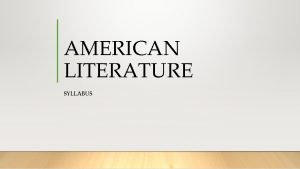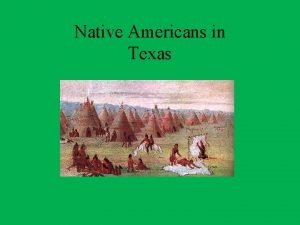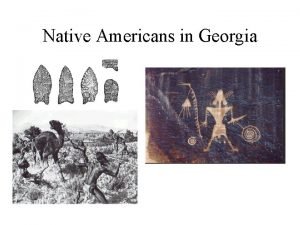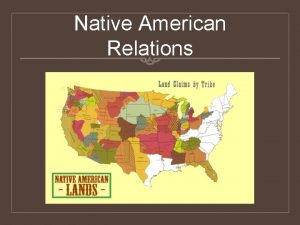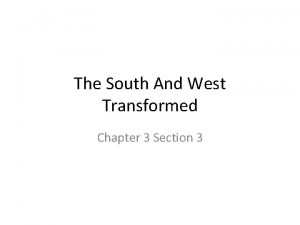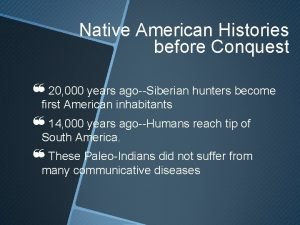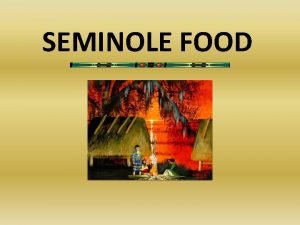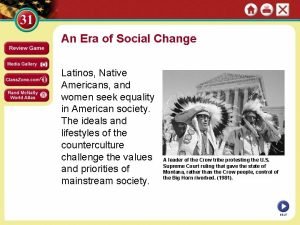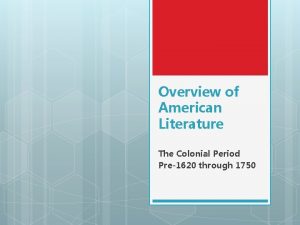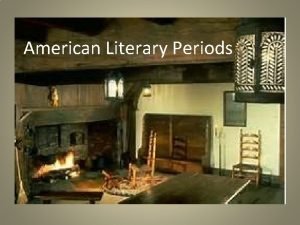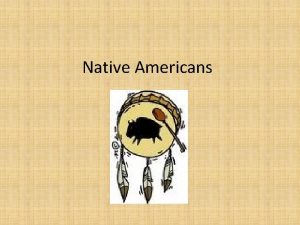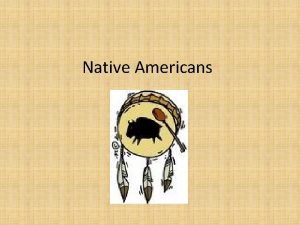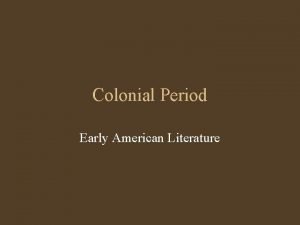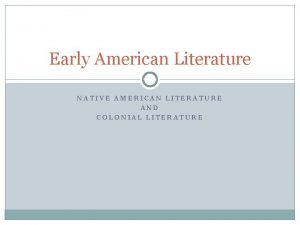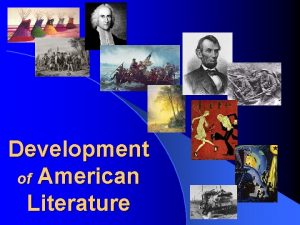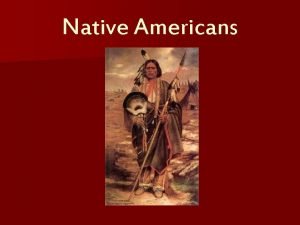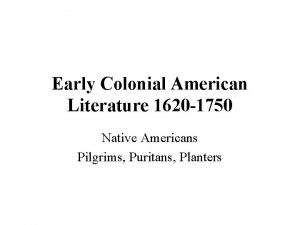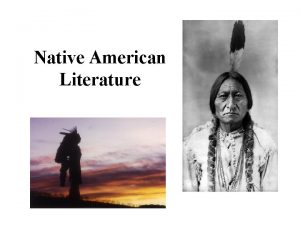PreColonial Colonial Era Early American literature Native Americans














- Slides: 14

Pre-Colonial & Colonial Era Early American literature

Native Americans • Native American tribes were the first to inhabit the Americas • They have resided in this region thirty times longer than the Europeans • No written, first-hand account of Native Americans exists • The Native Americans initially greeted the Europeans as friends—taught them agriculture and helped them to survive the harsh winters

Story Telling • Native Americans communicated using the oral tradition (stories spoken aloud rather than committed to paper) • Origin myths explained how life began—they were passed down through the generations • They did not have religious texts like the Bible or the Koran that were written down—instead, they employed sacred symbols drawn on tanned hides or embroidered beadwork

Decimation of the Native Americans • Contact with disease brought over by the Europeans wiped out a large number of natives—they had no acquired immunity • After the American Revolution (1783 --), George Washington set about to “civilize” the Native Americans and force them to assimilate to the Anglo-American culture • The 1830’s brought the doctrine of “manifest destiny” (western expansion)

Continued • The “Indian Removal Act” instructed the government, by force if necessary, to relocate the Native American population west of the Mississippi River • In the 1900’s, Native Americans were “forced” into signing treaties that gave up their lands and were granted “reservations” by the U. S. government • In 1924, Native Americans were granted citizenship

Puritans • The Puritans were English speaking Protestants in the 16 th and 17 th century who came to America for religious freedom because they believed the Church of England was corrupt.

Puritan Beliefs • Everyone is born sinful • Predestinatin--God has chosen a certain few of the “elect” for salvation. Unlike other Chiristians, they believed that faith alone was not enough. However, whether or not you were saved could be determined by your behavior--if you acted in a holy manner, it was assumed you were saved. • Simplicty over fanciness

Puritan Beliefs • • • Self-reliance Strong work ethic Frugality Education Disliked the few ruling over the many

Puritan writing styles • Narrative accounts--Tell the story of real life events. • Firsthand accounts-Created by people who lived through significant historical events. • Puritan plain style-Characterized by short words, direct statements, and references to ordinary, everyday objects.

Puritan writing styles • Sermons--Broadly speaking, speeches given form a pulpit in a house of worship. • The main purpose of Puritan writing was to provide spirtiual insight and instruction opposed to entertainment. • Oratory--Formal public speaking

John Smith (1580 -1631) • Led the first successful English colony in America • Helped found the colony of Jamestown, Virgiania in 1607 • President of the colony from 1608 to 1609 • Smith’s account is not considered 100% historically accurate due to his tendency to embellish his adventures.

William Bradford (1590 -1657) • Bradford wished to separate from the Church of England because he felt it was corrupt • Once in the colonies, Bradford was elected governor 30 times • Bradford was key in establishing good relationships with the Native Americans

Anne Bradstreet (1612 -1672) • • Considered the first American poet During her time, the occupation of writing was considered very unladylike Her poetry reflects the Puritan concern for the relationship between earthly and heavenly life. A common theme deals with the corruption of material desire

Jonathan Edwards (17031758) • • Attended Yale University at the age of 13 Railed against the decline of Puritanism, which began around 1700 His sermons were filled with symbolism of hell and torment Edwards adopted the “scared straight” style of preaching, hoping to use fear to motivate people from sinning
 Periodo precolombino en honduras
Periodo precolombino en honduras Periods of american literature
Periods of american literature Native american writing
Native american writing Southern literature syllabus
Southern literature syllabus Where did native americans come from
Where did native americans come from Where did native americans come from
Where did native americans come from How many native americans died on the trail of tears
How many native americans died on the trail of tears What three circumstances hurt native american
What three circumstances hurt native american Portuguese sailor
Portuguese sailor What did the seminoles eat
What did the seminoles eat Latinos and native americans seek equality
Latinos and native americans seek equality American literature colonial period
American literature colonial period American colonial period literature
American colonial period literature Romantic movement in american literature
Romantic movement in american literature Encounters and foundations to 1800 comprehension answers
Encounters and foundations to 1800 comprehension answers



